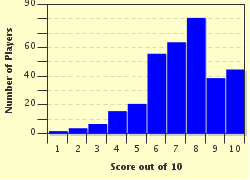Quiz Answer Key and Fun Facts
1. Some name meanings can be determined by splitting its parts and determining their separate definitions. One name means "desire" combined with "protection of the head." Which man with this name most likely had someone associated with him with that same desire when he used his archery skill to shoot something off of their head?
2. The name Christopher means "bearing Christ," and comes from Saint Christopher who literally carried Jesus across a river. Which Christopher died believing he had brought Christianity to a faraway, but known, continent?
3. Any parent wanting to name their boy Joseph should know that the name means "he will add," a good sign for his educational future. For which person was the name Joseph *NOT* a good fit?
4. One boy name means "victory of the people." While every December children across the world may think they have won thanks to a saint of the same name, what world leader was not very aptly-named when a victory of the people meant his ouster and death?
5. While this royal may not have been a soldier himself, his name means "famous warrior." During his reign, his country earned territorial gains in Roussillon, Artois, Dunkirk, Lille, Alsace, Franche-Comté, Strasbourg, and Briançon. Who was this man?
6. When given a name that means "brave power," one might expect a great leader. This man did not disappoint. Despite spending little time in the country he ruled, he was a beloved king. What king had a nickname that echoed the meaning of his name?
7. One ruler was basically a perfect fit for his name, meaning "home ruler." He decided not only to rule his home, but also head up his own church. What famous leader was this?
8. Some names simply represent a nationality. Francis, as well as its variants - Frank, François, Franz, etc. - naturally means "Frenchman." Which one of these people actually represents the name correctly?
9. This winner of the Nobel Prize in Physics fit well into his name, which means "noble" and "bright" - supposed to mean "luminous" rather than "smart" but fits much better with the latter definition. Who was this man?
10. There are of course cases where names are seemingly the complete opposite of the actual person. This man earned a name meaning "peaceful ruler" and yet went about setting up the Prussian Army, fought wars against Austria, and conquered parts of Poland. Who was it that went so far from his name?
Source: Author
illiniman14
This quiz was reviewed by FunTrivia editor
LeoDaVinci before going online.
Any errors found in FunTrivia content are routinely corrected through our feedback system.

